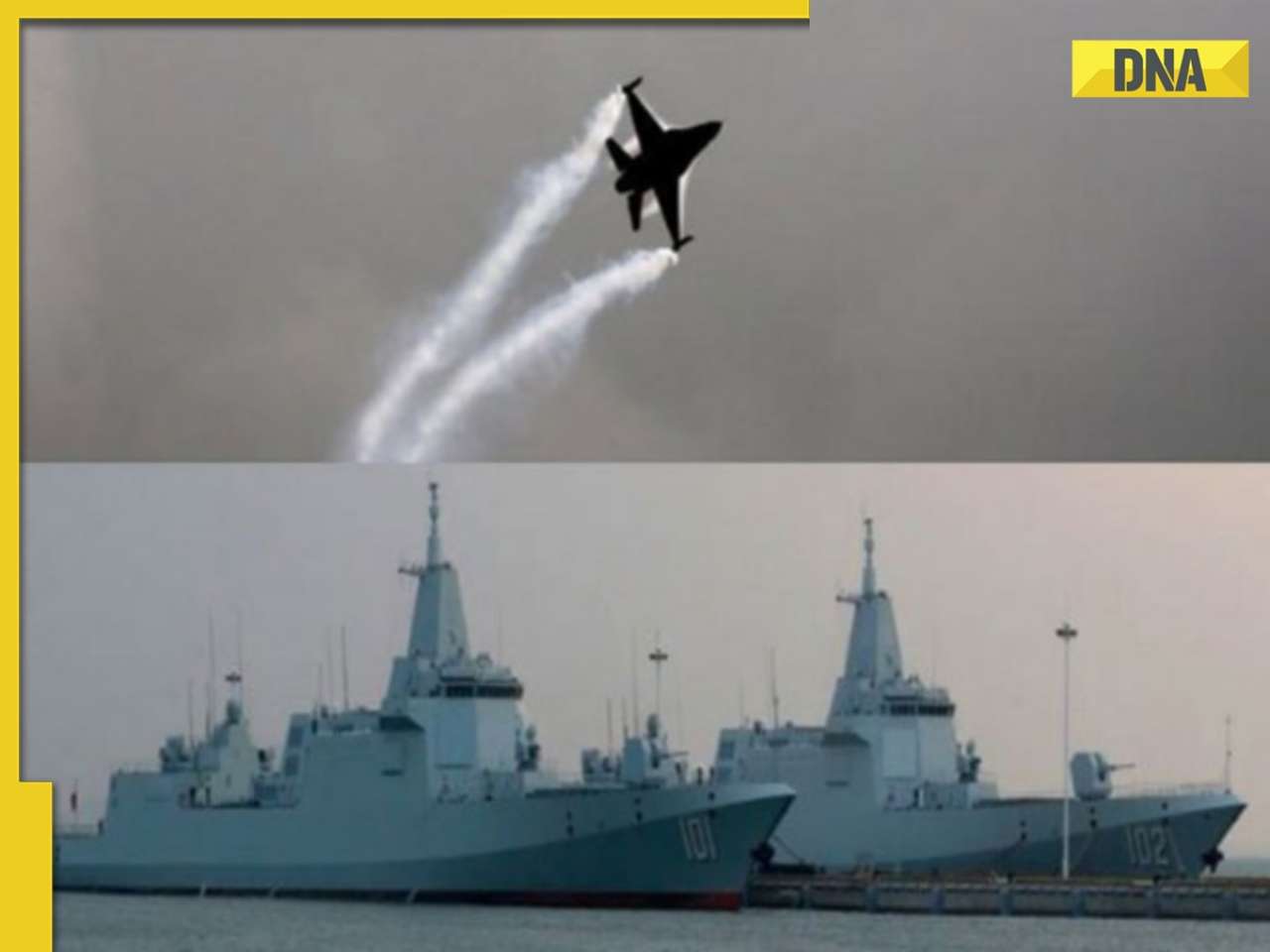North Korea's military staged a huge funeral procession in the snowy streets of the capital, Pyongyang, on Wednesday for its deceased "dear leader," Kim Jong-il.
North Korea's military staged a huge funeral procession in the snowy streets of the capital, Pyongyang, on Wednesday for its deceased "dear leader," Kim Jong-il, readying a transition to his son, Kim Jong-un.
Pictures from state television showed a funeral cortege led by a limousine carrying a huge picture of the 69-year old, who died on December 17, passing serried ranks of olive green-clad soldiers whose bare heads were bowed in homage in the main square of the capital.
A hearse carrying the coffin was led by a weeping Kim Jong-un, accompanied by Jang Song-thaek, his uncle and a key power-broker in the transition, and Ri Yong-ho, the army chief of staff.
"Seeing this white snow fall has made me think of the general's (Kim's) efforts and this brings tears to my eyes," Seo Ju-rim, a red-cheeked, weeping female soldier, told North Korean television.
One of the myths surrounding Kim Jong-il was that he could control the weather and state media has reported unusually cold and wild weather accompanying his death.
The video of weeping civilians, who swayed with grief and shouted "father, father", appeared to be out of synch with the audio on the broadcast. It was not clear whether it was live or recorded as black Lincoln and Mercedes limousines as well as army trucks streamed past the crowds.
Kim Jong-un will become the third member of the family to run the isolated and unpredictable North Asian country as it enters 2012, the year that was supposed to mark its self-proclaimed transformation into a "strong and prosperous" nation.
"The footage highlights the rising status of Jang Song-thaek ever since the first news of Kim Jong-il's death," said Yoo Ho-yeol, a North Korea expert at Korea University in the south.
"Kim Jong-un is clearly the head of the new leadership but, in terms of hierarchy and influence, Jang appears to have secured considerable position," he said.
It would seem, however, that little is set to change for the 25 million citizens of a country that has staged what many analysts have dubbed a "Great March Backwards" over the past 20 years.
Despite growth that has propelled South Korea to become the world's 13th largest economy, a powerhouse that makes computers, mobile telephones and cars, there are some in the capital of Seoul who believe life is better in the impoverished North.
As the world watched Wednesday's funeral of dictator Kim Jong-il, who presided over famine, a nuclear arms push and military skirmishes with the South, Choi Dong Jin, 48, told Reuters that Kim was "a great and outstanding person" for resisting U.S. imperialism.
Choi is Editor in Chief for the Pan-Korea Alliance for Reunification, a body that promotes the North and unification of the Korean peninsula.
He sits in his office in Seoul's financial district, a smartphone on his desk, beneath a picture of Kim Jong-il in 2000 meeting former South Korean President Kim Dae-jung, whose engagement with the North, known as the "Sunshine Policy", has been halted by the current conservative government in Seoul.
"The presence of Kim Jong-Il had prevented the US from waging a war on the Korean Peninsula," Choi told Reuters.
Sympathisers like Choi risk arrest and imprisonment in South Korea even though they appear to be a fringe group.
Under the conservative administration of President Lee Myung-bak, 151 people were questioned for offences involving praising North Korea last year, up from 39 in 2007, according to the National Police Agency data.
By contrast, some 200,000 North Koreans are in forced labour camps for crimes against the regime, according to human rights group Amnesty International.
One member of a body campaigning against South Korea's six-decade old national security law told Reuters that the succession process that will see the 20-something son of Kim Jong-il, Kim Jong-un, take power looked more "efficient" than South Korea's democratic presidential elections.
In South Korea, a president can serve only one five-year term under the country's constitution that was enacted since the advent of democracy in 1987.
![submenu-img]() 'Baap re baap': Imtiaz Ali reveals Diljit Dosanjh was scandalised by old women's 'vulgar' improvisation on Chamkila set
'Baap re baap': Imtiaz Ali reveals Diljit Dosanjh was scandalised by old women's 'vulgar' improvisation on Chamkila set![submenu-img]() Viral video: Man educates younger brother about mensuration, internet is highly impressed
Viral video: Man educates younger brother about mensuration, internet is highly impressed![submenu-img]() Taiwan detects seven Chinese military aircraft, five naval vessels near its waters
Taiwan detects seven Chinese military aircraft, five naval vessels near its waters![submenu-img]() This actor, who worked with Karan Johar and Farhan Akhtar, gave superhit shows, saw failed marriage, killed himself at..
This actor, who worked with Karan Johar and Farhan Akhtar, gave superhit shows, saw failed marriage, killed himself at..![submenu-img]() Girl's wedding dance to Haryanvi song interrupted by mother in viral video, internet reacts
Girl's wedding dance to Haryanvi song interrupted by mother in viral video, internet reacts![submenu-img]() DNA Verified: Is CAA an anti-Muslim law? Centre terms news report as 'misleading'
DNA Verified: Is CAA an anti-Muslim law? Centre terms news report as 'misleading'![submenu-img]() DNA Verified: Lok Sabha Elections 2024 to be held on April 19? Know truth behind viral message
DNA Verified: Lok Sabha Elections 2024 to be held on April 19? Know truth behind viral message![submenu-img]() DNA Verified: Modi govt giving students free laptops under 'One Student One Laptop' scheme? Know truth here
DNA Verified: Modi govt giving students free laptops under 'One Student One Laptop' scheme? Know truth here![submenu-img]() DNA Verified: Shah Rukh Khan denies reports of his role in release of India's naval officers from Qatar
DNA Verified: Shah Rukh Khan denies reports of his role in release of India's naval officers from Qatar![submenu-img]() DNA Verified: Is govt providing Rs 1.6 lakh benefit to girls under PM Ladli Laxmi Yojana? Know truth
DNA Verified: Is govt providing Rs 1.6 lakh benefit to girls under PM Ladli Laxmi Yojana? Know truth![submenu-img]() Streaming This Week: Heeramandi, Shaitaan, Manjummel Boys, latest OTT releases to binge-watch
Streaming This Week: Heeramandi, Shaitaan, Manjummel Boys, latest OTT releases to binge-watch![submenu-img]() Remember Ayesha Kapur? Michelle from Black, here's how actress, nutrition coach, entrepreneur looks after 19 years
Remember Ayesha Kapur? Michelle from Black, here's how actress, nutrition coach, entrepreneur looks after 19 years![submenu-img]() Remember Heyy Babyy's cute 'Angel' Juanna Sanghvi? 20 year-old looks unrecognisable now, fans say 'her comeback will...'
Remember Heyy Babyy's cute 'Angel' Juanna Sanghvi? 20 year-old looks unrecognisable now, fans say 'her comeback will...'![submenu-img]() In pics: Arti Singh stuns in red lehenga as she ties the knot with beau Dipak Chauhan in dreamy wedding
In pics: Arti Singh stuns in red lehenga as she ties the knot with beau Dipak Chauhan in dreamy wedding![submenu-img]() Actors who died due to cosmetic surgeries
Actors who died due to cosmetic surgeries![submenu-img]() DNA Explainer: Why Harvey Weinstein's rape conviction was overturned, will beleaguered Hollywood mogul get out of jail?
DNA Explainer: Why Harvey Weinstein's rape conviction was overturned, will beleaguered Hollywood mogul get out of jail?![submenu-img]() What is inheritance tax?
What is inheritance tax?![submenu-img]() DNA Explainer: What is cloud seeding which is blamed for wreaking havoc in Dubai?
DNA Explainer: What is cloud seeding which is blamed for wreaking havoc in Dubai?![submenu-img]() DNA Explainer: What is Israel's Arrow-3 defence system used to intercept Iran's missile attack?
DNA Explainer: What is Israel's Arrow-3 defence system used to intercept Iran's missile attack?![submenu-img]() DNA Explainer: How Iranian projectiles failed to breach iron-clad Israeli air defence
DNA Explainer: How Iranian projectiles failed to breach iron-clad Israeli air defence![submenu-img]() 'Baap re baap': Imtiaz Ali reveals Diljit Dosanjh was scandalised by old women's 'vulgar' improvisation on Chamkila set
'Baap re baap': Imtiaz Ali reveals Diljit Dosanjh was scandalised by old women's 'vulgar' improvisation on Chamkila set![submenu-img]() This actor, who worked with Karan Johar and Farhan Akhtar, gave superhit shows, saw failed marriage, killed himself at..
This actor, who worked with Karan Johar and Farhan Akhtar, gave superhit shows, saw failed marriage, killed himself at..![submenu-img]() Did you know Ranveer Singh's grandmother was popular actress? Worked with Raj Kapoor; her career affected due to...
Did you know Ranveer Singh's grandmother was popular actress? Worked with Raj Kapoor; her career affected due to...![submenu-img]() India's highest-paid TV actress began working at 8, her Bollywood films flopped, was seen in Bigg Boss 1, now charges...
India's highest-paid TV actress began working at 8, her Bollywood films flopped, was seen in Bigg Boss 1, now charges...![submenu-img]() Shreyas Talpade wonders if his heart attack was due to Covid vaccine: 'We don’t know what we have taken inside...'
Shreyas Talpade wonders if his heart attack was due to Covid vaccine: 'We don’t know what we have taken inside...'![submenu-img]() IPL 2024: Faf du Plessis, Virat Kohli help Royal Challengers Bengaluru defeat Gujarat Titans by 4 wickets
IPL 2024: Faf du Plessis, Virat Kohli help Royal Challengers Bengaluru defeat Gujarat Titans by 4 wickets![submenu-img]() IPL 2024: Why is Sai Kishore not playing today's RCB vs GT match?
IPL 2024: Why is Sai Kishore not playing today's RCB vs GT match?![submenu-img]() 'Mumbai Indians ki kahani khatam': Ex-India star slams Hardik Pandya after MI's loss to KKR at Wankhede
'Mumbai Indians ki kahani khatam': Ex-India star slams Hardik Pandya after MI's loss to KKR at Wankhede![submenu-img]() LSG vs KKR, IPL 2024: Predicted playing XI, live streaming details, weather and pitch report
LSG vs KKR, IPL 2024: Predicted playing XI, live streaming details, weather and pitch report![submenu-img]() LSG vs KKR IPL 2024 Dream11 prediction: Fantasy cricket tips for Lucknow Super Giants vs Kolkata Knight Riders
LSG vs KKR IPL 2024 Dream11 prediction: Fantasy cricket tips for Lucknow Super Giants vs Kolkata Knight Riders![submenu-img]() Viral video: Man educates younger brother about mensuration, internet is highly impressed
Viral video: Man educates younger brother about mensuration, internet is highly impressed![submenu-img]() Girl's wedding dance to Haryanvi song interrupted by mother in viral video, internet reacts
Girl's wedding dance to Haryanvi song interrupted by mother in viral video, internet reacts![submenu-img]() Viral video: Man fearlessly grabs dozens of snakes, internet is scared
Viral video: Man fearlessly grabs dozens of snakes, internet is scared![submenu-img]() This mysterious mobile phone number was suspended after three users...
This mysterious mobile phone number was suspended after three users...![submenu-img]() School principal, teacher engage in physical altercation in Agra, video goes viral
School principal, teacher engage in physical altercation in Agra, video goes viral















































)
)
)
)
)
)